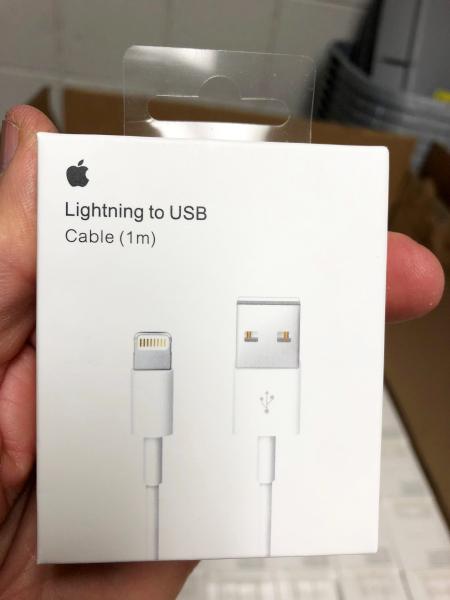PITTSBURGH – Today’s latest smart phones cost a hefty $1,000 or more, but some consumers try to save a buck by purchasing cheaper, counterfeit charging cables that could seriously damage their phone batteries or the entire smart phone. Intercepting counterfeit products remains a trade enforcement priority for U.S. Customs and Border Protection and CBP officers continue to seize counterfeit phone chargers.

CBP officers in Pittsburgh recently seized 588 Apple Lightning charging cables and 64 Apple AirPods during two recent seizures. The products collectively would have had a manufacturer’s suggested retail price of about $24,000, if authentic.
Both shipments arrived in early May from Hong Kong and both were destined to separate addresses in Allegheny County, Pa. CBP officers suspected the products were counterfeit and confirmed that suspicion with the trademark holder. The seized products will be destroyed.
“Consumers should be aware that if a price for a product is too good to be true, then the product is likely counterfeit and potentially harmful,” said Casey Durst, CBP’s Director of Field Operations in Baltimore. “Customs and Border Protection urges consumers to protect themselves and their families by purchasing safe, authentic goods from reputable vendors.”
CBP protects businesses and consumers every day through an aggressive Intellectual Property Rights (IPR) enforcement program. Importation of counterfeit merchandise can cause significant revenue loss, damage the U.S. economy, and threaten the health and safety of the American people.
On a typical day in 2019, CBP officers seized $4.3 million worth of products with Intellectual Property Rights violations. Learn more about what CBP did during "A Typical Day" in 2019.
CBP officers and Homeland Security Investigation (HSI) agents seized 27,599 shipments containing counterfeit goods in Fiscal Year (FY) 2019, down from 33,810 seizures in FY 2018. However, the total estimated manufacturer’s suggested retail price (MSRP) of the seized goods, had they been genuine, increased to over $1.5 billion from nearly $1.4 billion in FY 2018.

E- Commerce sales have contributed to large volumes of low-value packages imported into the United States. In FY 2019, there were 144 million express shipments and 463 million international mail shipments. Over 90 percent of all intellectual property seizures occur in the international mail and express environments
The People’s Republic of China (mainland China and Hong Kong) remained the primary source economy for seized counterfeit and pirated goods, accounting for 83 percent of all IPR seizures and 92 percent of the estimated MSRP value of all IPR seizures.
Read CBP’s Intellectual Property Seizure Report for Fiscal Year 2019 for more IPR stats and analysis.
CBP's border security mission is led at ports of entry by CBP officers from the Office of Field Operations. Please visit CBP Ports of Entry to learn more about how CBP’s Office of Field Operations secures our nation’s borders. Learn more about CBP at www.CBP.gov.
Follow the Director of CBP’s Baltimore Field Office on Twitter at @DFOBaltimore and on Instagram at @dfobaltimore for breaking news, current events, human-interest stories and photos.

